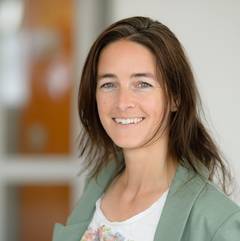15 September 2014
Salzburg's Showcase wrap up. An interview with Julia Eder
CreativeCH is approaching its end, and therefore it is the time to draw some conclusions. What have been the main experiences and results of the Salzburg Showcase?
The CreativeCH Showcase in Salzburg allowed us to acquire a lot of experiences in local creative co-operation on cultural heritage, and we are very happy about the showcase results:
We talked to, involved and worked with representatives of several cultural heritage institutions, creative industry businesses, universities and organisations for youth education and media activities. The showcase also involved 230 students and other young people through surveys, ideas workshops, and active participation such as testing and development of own creative applications.
We established the portal “Kulturerleben” (experience culture), which is now the focus of all our co-operations on local heritage themes and tours. We avail of a collection of about 400 content items, mostly historical photographs available under license agreements with partners, and many current views of places and objects in the town owned by us. We expect the collection to grow with content of new partners wishing to present it on the portal as aspects of the cultural history of Salzburg.
Furthermore we avail of the showcase website that will serve as communication channel for future local/regional projects.
Among the major results also are the results of our surveys and ideas workshops on young people’s notions and perceptions of, and expectations from, cultural heritage – which are available for anybody in English here.
The goal of your showcase was to communicate different aspects of heritage in more creative and diverse ways. Surely a great challenge in a showcase confronting the “internationally branded, stereotypical image of Salzburg” – as your colleague Andreas Strasser put it in our last interview. What did you learn from the showcase experience?
We did not confront the established touristic brand image of the City of Salzburg, at least not heads-on. This image is extremely strong and actually very important for the city in economic terms. We explored requirements for communicating local heritage in different ways, i.e. heritage other than the established image and in ways that do not re-enforce it. Therefore we looked for different content and involved cultural heritage institutions and young people in the creation of prototypic showcase applications.
The experiences of the first two applications however showed that it is not effective to produce a stand-alone application for each co-operation. We needed a platform that is capable to integrate and present on the Web and on mobile devices all content we have already available and further content we expect to receive from new local partners. Therefore we implemented such a platform, which is necessary as a basis for sustainable co-operations.
The platform “Kulturerleben” already presents a lot of local cultural heritage content, organised in virtual tours. For example, visitors can explore historic and current views of many places in the town, poems of the local author Georg Trakl related to certain places, images of historical inns and breweries, bridges, doors and windows, etc. Recently we also added a virtual tour on the important regional theme of salt.
The key point is that we can now forge new partnerships and integrate content rather easily, extending the portal with new themes and virtual tours. The portal is perceived by potential new partners as a good way to present specific cultural heritage in a wider context. As Salzburg Research avails of technical capacity in Web and mobile technologies we do not depend on external technical support providers. A major requirement however is that a new co-operation partner has their content copyright-cleared and prepared properly, e.g. images should come in good quality and with sufficient description.
Your experience is for sure unique in Europe. But one of the CreativeCH’s goals was to help other towns and regions follow your experience. How do you think others can take advantage from Salzburg's showcase findings?
While the local heritage of other towns and regions is of course different, some of our lessons learned are:
Cooperation: Close cooperation with local and regional organisations – cultural heritage institutions, universities and others – is pivotal, as they can bring in content, knowledge and networks (e.g. important contacts).
Cultural heritage institutions: It is important to work with cultural heritage institutions that are eager to share their content and knowledge. However, it must be noted that such institutions often lack knowledge in content licensing and expect that the content is presented in a certain way, e.g. not mixed with content of other providers or user-generated content or comments.
Content: The content of a showcase application arguably requires most effort. This includes several meetings with content owners/holders (to “unlock”, identify and select relevant content), negotiation of content licenses, and content preparation (formats, description) until it can finally be integrated in a technical application.
Involvement of young people: To address and involve students and other young people, partnerships with relevant university programmes and youth organisations must be established. Many young people can be involved rather easily in surveys and ideas workshops, but “hands on” participation (e.g. application development by students) requires a lot of support and therefore is possible only for a small group of students.
Creative industries: Creative businesses can share important expertise, e.g. concerning attractive media products, targeted marketing, etc. While the businesses are usually willing to share some knowledge (e.g. in workshops), they are of course looking for commissioned work. This means that it is difficult to establish partnerships without a clear prospect of income for the businesses (e.g. a funded project).
back

